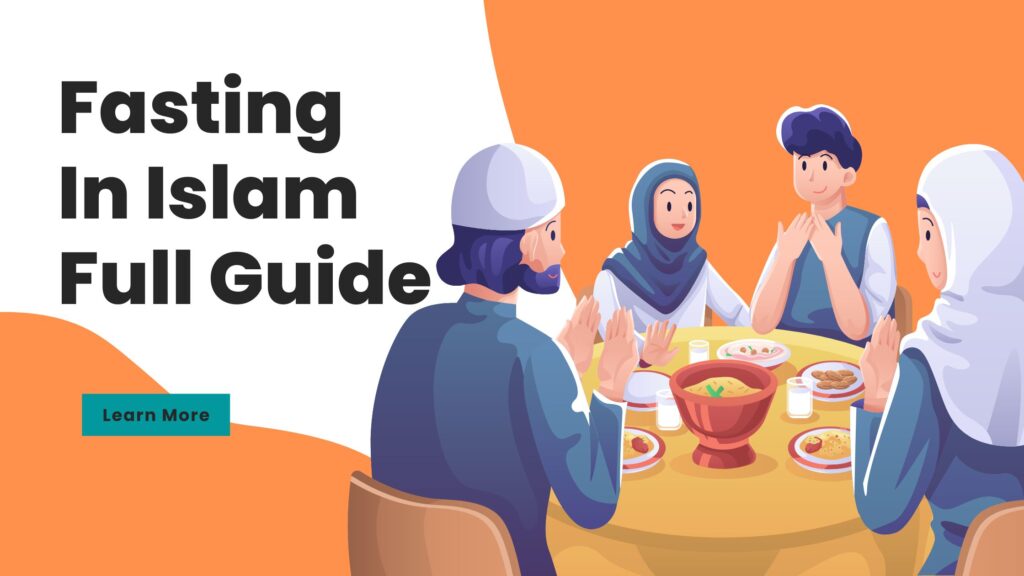Fasting is the fourth pillar of Islam that Allah prescribed in the second Hijri year. Muslims are obliged to perform this worship during Ramadan. Voluntary fasting is a non-obligatory type that enables Muslims to follow the Messenger of Allah’s Sunnah.
So what is fasting? What are the origins of fasting? Why is it important? What are its types? Check out all the answers in this article.
What is Fasting In Islam?
Fasting in Islam (Sawm) is the fourth pillar that comes after Zakat and the obligatory worship of Ramadan. The ninth month in the Hijri calendar and the month of worship as Muslims don’t only fast but also do other cults such as reciting the Quran, praying Taraweeh, and giving Sadaqah.
Muslims fast the whole month of Ramadan to obey Allah, who commanded his believers to perform this worship {O believers! Fasting is prescribed for you—as it was for those before you—so perhaps you will become mindful of Allah} (Al-Baqara, 2:183).
Fasting is a key to entering paradise and rescuing from the fire in the hereafter. It carries countless rewards for Muslims. On the health side, fasting is beneficial to blood pressure, sugar, heart, digestive system, and brain health.
The History of Fasting in Islam
The History of fasting in Islam starts in the second Hijri year, Allah prescribed fasting by revealing the verse of sawm in Surah Al Baqarah {O believers! Fasting is prescribed for you—as it was for those before you—so perhaps you will become mindful of Allah} (2:183).
Before prescribing fasting in Islam, the Quraish tribe in the Jahiliya period used to fast on Ashura day as the Jewish fasted this day to thank Allah for rescuing Moses (AS) from drowning.
It’s noteworthy that Ashura sawm was obligatory for one year before binding Ramadan fasting.
What is the Purpose of Fasting in Islam?
The purpose of prescribing fasting in Islam is to train the believers to abstain from appetites, get used to patience and endurance, overcome bad habits obey Allah and seek his pleasure, and get closer to him.
Moreover, Fasting is a chance for Muslims to liberalize themselves from material slavery and learn how to manage their cravings.
Fasting in Ramadan is a spiritual worship that reminds Muslims of Allah’s blessings of food and drinks that they refrain from for over 8 hours a day in Ramadan.
What are the Virtues of Fasting in Islam?
Fasting in Islam carries many virtues for Muslims that tell you why it’s important in Islam. Here are the most significant benefits:
1. Entering paradise by fasting
Fasting in Islam is one of the reasons for rewarding with paradise. In the Hereafter, fast persons enter the Jannah through the gate of Al-Raiyan.
Sahl Ibn Saad (RA) reported that prophet Muhammed (PBUH) said:” There is a gate in Paradise called Ar-Raiyan, and those who observe fasts will enter through it on the Day of Resurrection and none except them will enter through it. It will be said, ‘Where are those who used to observe fasts?’ They will get up, and none except them will enter through it. After their entry, the gate will be closed, and nobody will enter through it.” (Sahih Bukhari)
2. Fasting provides Protection from the hell
One of the reasons for rescuing from the fire is fasting. Prophet Muhammed said:” Fasting is a shield or protection from the fire (Hell) and from committing sins” ( Sahih Bukhari).
3. Forgiving from the sins
Allah rewards his believers who fast during Ramadan month with sins forgiveness. Abu Hurairah (RA) narrated that the Messenger of Allah said: “Whoever observes fasts during the month of Ramadan out of sincere faith and hoping to attain Allah’s rewards, then all his past sins will be forgiven.” (Sahih Bukhari).
4. Fasting is a way of answering the duas
The fasting person is among the believers that Allah answers their supplication. Prophet Muhammed said:” The fasting person when he breaks his fast, the just leader, and the supplication of the oppressed person” (Jami’ at-Tirmidhi).
5. Fasting is a great reward
Prophet Muhammed (PBUH) said:” The reward of every (good) deed of a person is multiplied from ten to seven hundred times”.
6. The mouth’s fasting person is better than musk
According to the prophetic narration, Prophet Muhammed (PBUH) said:” Verily, the smell of the mouth of a fasting person is better to Allah than the smell of musk.” [Al-Bukhari and Muslim]
7. A Joy for the fast person
Sawm carries joy for the fast person while breaking fasting, and another one when he meets Allah in the hereafter.
Prophet Muhammed (PBUH) said:” There are two joys for the fasting person: the joy when he breaks his fast, and the joy of when he meets his Lord.” [Al-Bukhari and Muslim]
If you need to know about the other pillars of Islam, check out the Islamic studies course from Quran House Academy, which guides you to learning Aqidah, Ethics, Fiqh, Hadith, Islamic History, and Tafseer.
Health Benefits of Fasting in Islam
Scientists found several health benefits of fasting including that fasting carries multiple health benefits. Here are ten benefits of it:
- Regulating blood sugar.
- Reducing bad cholesterol and improving heart health.
- Protecting from chronic diseases such as diabetes.
- Regulating blood pressure.
- Improving digestive system
- Purifying the body from toxins.
- Lowering mental stress.
- Boosting cardiovascular health.
- Enhancing brain health.
- Boosting metabolism and protecting from Obesity.
How to practice Fasting in Islam?
Muslims perform fasting by refraining from eating, drinking, smoking, and having intimate intercourse.
They start fasting from down to the sunset, according to the holy Quran {You may eat and drink until you see the light of dawn breaking the darkness of night, then complete the fast until nightfall} (Al-Baqara, 2:187)
What Are the People who must Fast Ramadan?
Those who fast in Islam should be:
- Muslims.
- Adults.
- Reasonable (sane people).
- Capable of fasting.
- Purified from menstruation and postpartum (for women).
What are the Fasting Days in Islam?
According to the Hijri calendar, Muslims fast the obligatory and voluntary days, which are:
- The 30 or 29 days of Ramadan month.
- The six days of Shawwal.
- Mondays and Thursdays.
- The days of Arafah.
- The days Shabaan.
- The 13th, 14th, and 15th days of the lunar months.
- Day of Ashura (The 10th day of Muharram).
Voluntary Fasts in Islam
Voluntary fasts are called “Sunnah” or “Nafil”, as the prophet Muhammed used to fast after Islam’s advent. For Instance, Fasting on Ashura day and Arafa day are voluntary fasts.
Muslims perform non-obligatory fasting to follow Sunnah, be closer to Allah, and atone for their sins.
Types of fasting in Islam
Fasting in Islam includes five types, which are:
- Obligatory (Fard): It’s the fasting of Ramadan.
- Wajib: It’s fasting that occurs on non-fixed days. Muslims are obliged to perform it if they missed Ramadan days (Fard).
- Sunnah and Nafil: It’s a non-obligatory type of fasting to follow Sunnah like sawm Mondays and Thursdays.
- Makrooh: It’s undesirable fasting that Muslims perform in certain conditions and days such as fasting on Friday only.
- Makrooh Tahreemi: It’s a forbidden type such as fasting during menstruation.
For More information about fasting, please join our courses:
- Islamic Studies Crash Course
- Islamic Aqeedah Course
- Learn Tafseer Quran
- Comparative Religions Course
- Purify Your Soul – Tazkiyah Course
- Hadith Courses
Ramadan-related articles:
| Losing Weight During Ramadan! |
| The Rules of Itikaf |
| What is Ramadan Kareem? |
| Qiyam Al-layl Prayer |
| Eid Wishes – Eid Mubarak |
| What is Eid Al Fitr? |
| What is Zakat Al Fitr? |
| What After Ramadan? |
| Ramadan Activities For Students |
| Ramadan Events And Physical Activities |
| Ramadan Activities for Kids |
| What should you not do during Ramadan? |





